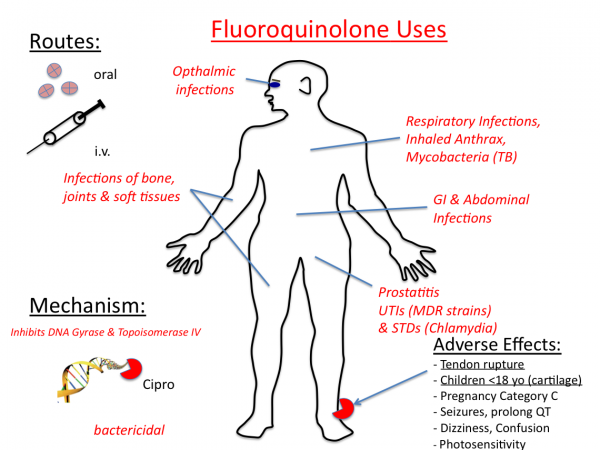Fluoroquinolones (Quinolones)
This page is a copy of: http://tmedweb.tulane.edu/pharmwiki/doku.php/fluoroquinolones

- Examples:
- Ciprofloxacin (Cipro ®)
- Levofloxacin (Levaquin ®)
- Moxifloxacin (Avelox, Avelox IV ®)
- Gemifloxacin (Factive ®)
- Drug Class: DNA Gyrase Inhibitors; derivatives of nalidixic acid & chloroquine
- Mechanism of Action:
- <fc #660000>Interference with</fc> the activity of <fc #660000>DNA gyrase (bacterial topoisomerase II)</fc> & <fc #660000>topoisomerase IV</fc> (the enzymes that cause DNA to rewind after copying)
- <fc #660000>Bactericidal</fc>
- fluoroquinolones exert a “<fc #660000>post-antibiotic effect</fc>” or persistent suppression of bacterial growth after limited exposure to the antibiotic imilar to aminoglycosides) (see Time- & Concentration-Dependent Killing).
- Chromosomally mediated acquired resistance
- Indications:
- 2016 FDA Warning: The FDA has determined that fluoroquinolones should be reserved for use in patients who have no other treatment options for infections because otherwise the risk of serious side effects (see below) generally outweighs their benefits (FDA Safety alert: 7/26/16).
- <fc #660000>MRSA</fc> & Streptococcus.
- <fc #660000>Ciprofloxacin: UTIs, gastroenteritis, <fc #660000>complicated intra-abdominal infections</fc>, osteomyelitis, anthrax</fc> (use has become limited due to growing resistance).
- <fc #660000>RESPIRATORY FLUOROQUINOLONES</fc> have enhanced Gram + activity & against atypical pneumonia agents (chlamydia, mycoplasma & legionella)
- <fc #660000>Levofloxacin: with improved activity against pneumococcus</fc>
- <fc #660000>Moxifloxacin: improved activity against anaerobes & Mycobacterium tuberculosis; hepatic clearance results in low urinary levels (not recommended for UTIs)</fc>
- <fc #660000>Gemifloxacin:</fc> similar spectrum as moxifloxacin, little hepatic metabolism, eliminated/excreted in the urine & feces
- Contraindications:
- <fc #660000>Not recommended in pregnancy</fc> - (a Pregnancy Class C drug); they should be used during pregnancy only if the potential benefit justifies the potential risk to the fetus.
- <fc #660000>Not recommended as drug of 1st choice in pediatric patients (<18 yrs) due to cartilage toxicity</fc>.
- Avoid in patients with Glucose-6-phosphate Dehydrogenase <fc #660000>(G6PD) deficiency</fc>.
- Side Effects:
- <fc #660000>Potentially disabling adverse reactions may begin within hours or weeks of treatment initiation; data suggest that such reactions last, on average, 14 months after stopping treatment</fc> (FDA Safety alert: 7/26/16).
- <fc #660000>Cartilage toxicity</fc> and joint swelling in children
- <fc #660000>Increased risk of tendonitis & tendon rupture (esp. Achilles tendon)</fc>
- <fc #660000>Peripheral neuropathy that may be irreversible</fc>
- <fc #660000>Pseudomembranous Colitis caused by overgrowth of Clostridium difficile</fc>. C. difficile is a bacteria normally present within the GI tract in small numbers, but can cause harm when it contributes to a superinfection of the colon because it produces exotoxins A and B that damage the lining of the colon, causing bleeding, inflammation and diarrhea
- CNS side effects (depression, psychosis)
- Joint pain & swelling, muscle pain
- GI (nausea & vomiting)
- Skin reactions
- QTc prolongation
- Worsening of myasthenia gravis
<box 80% #fff #fff #ccc #000| Black Box Warnings: TENDINITIS, TENDON RUPTURE, Worsening of Myasthenia Gravis> Fluoroquinolones are associated with an increased risk of TENDINITIS & TENDON RUPTURE in all ages. The risk is increased in patients >60 yo, in patients taking corticosteroids, and in patients with kidney, lung or heart transplants. To reduce the development of drug-resistant bacteria, the use of fluoroquinolones should be used only to treat or prevent infections that are proven or strongly suspected to be caused by bacteria.
Fluoroquinolones may exacerbate muscle weakness in persons with myasthenia gravis. Avoid use of this class of antibiotics in patients with a known history of myasthenia gravis. </box>
<box 80% #fff #fff #ccc #000| Fluoroquinolones & Mitochondrial Toxicity > The mechanisms by which fluoroquinolones exert their toxic side effects in patients remains poorly understood. Fluoroquinolones have been reported to induce mitochondrial related oxidative stress and damage of mitochondiral DNA (Lawrence et al, 1996; Pouzaud et al, 2006; Li et al, 2010; Kalghatgi et al, 2013). These toxic effects may result from inhibiting mitochondrial “topoisomerase II-like” activity (Lawrence et al, 1999). Other studies suggest that fluoroquinolone damage to tendons may also result from sequestering of magnesium, a mineral essential for the normal function of integrins involved in cell-to-cell adhesion (Sendzik et al, 2009). </box>
- Pharmacokinetics:
- Oral or IV administration, widely distributed.
- Anatacids decrease oral bioavailability.
- Penetrates in most tissues including prostate, however poor penetration into the CSF.
- Ciprofloxacin & Levofloxacin: Metabolism (20%), renal excretion (80%). Dosage adjustment may be needed in renal failure.
- Moxifloxacin undergoes hepatic elimination & does not require dosage adjustment in renal failure
- Gemifloxacin is metabolized to a limited extent by the liver, it is excreted into the feces & urine
- Drug Interactions:
- Avoid combining with other drugs that prolong the QTc (to avoid producing Torsade de pointes)
- References:
- Deck DH, Winston LG (2015): Sulfonamides, Trimethoprim & Quinolones (Chapter 46). In: Basic and Clinical Pharmacology. 13e. Katzung BG,Trevor AJ (Editors). McGraw-Hill / Lange.
- Kalghathi S et al. (2013): Bactericidal Antibiotics Induce Mitochondrial Dysfunction and Oxidative Damage in Mammalian Cells. Sci Transl Med. 5(192): 192ra85. doi: 10.1126/scitranslmed.3006055
- Lawrence JW et al (1996): Delayed cytotoxicity and cleavage of mitochondrial DNA in ciprofloxacin-treated mammalian cells. Mol Pharm 50(5):1178-1188.
- Li Q et al (2010): Ofloxacin induces oxidative damage to joint chondrocytes of juvenile rabbits: Excessive production of reactive oxygen species, lipid peroxidation and DNA damage. Eur J Pharmacol 626:146-153. doi:10.1016/j.ejphar.2009.09.044
- Pouzaud F et al (2006): Age-dependent effects on redox status, oxidative stress, mitochondrial activity and toxicity induced by fluoroquinolones on primary cultures of rabbit tendon cells. Comp Biochem Physiol C Toxicol Pharmacol. 143(2):232-41. DOI: 10.1016/j.cbpc.2006.02.006
- Sendzik J et al (2009): Quinolone-induced arthropathy: an update focusing on new mechanistic and clinical data. Int J Antimicrob Agents 33(3):194-200. doi: 10.1016/j.ijantimicag.2008.08.004.